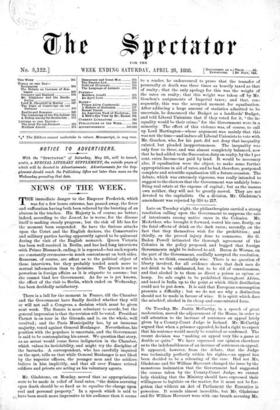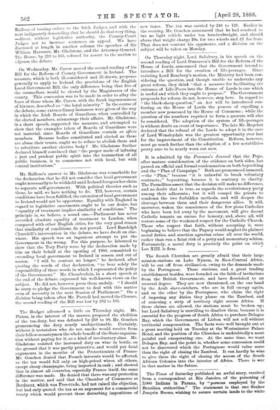On Tuesday, Mr. Justin McCarthy, in a speech of great
moderation, moved the adjournment of the House, in order to call attention to the increase of sentences on appeal lately given by a County-Court Judge in Ireland. Mr. McCarthy argued that when a prisoner appealed, he had a right to expect that his sentence would merely be remitted or confirmed. The recent decision was "making an appeal very like a game at double or quits." We have expressed our opinion elsewhere as to the indefensibleness of an increase of sentences on appeal. It appeared, however, from the debate, that the Judge was technically perfectly within his rights,—an appeal has been decided to be a rehearing of the case. Had not Mr. Gladstone and Sir William Harcourt changed the issue by the monstrous insinuation that the Government had suggested the course taken by the County-Court Judge, we cannot help thinking that the Ministry should have expressed their willingness to legislate on the matter, for it must not be for- gotten that without an Act of Parliament the Executive is powerless. It sounds almost incredible, but Mr. Gladstone and Sir William Harcourt were with one breath accusing Mr.
Balfour of issuing orders to the Irish Judges, and with the next indignantly demanding that he should do that very thing, —direct, without legislative authority, the Comity-Court Judges not to increase sentences on appeal. We have discussed at length in another column the speeches of Sir William Harcourt, Mr. Gladstone, and the Attorney-General. The House, by 219 to 165, refused its assent to the motion to adjourn the debate.



































